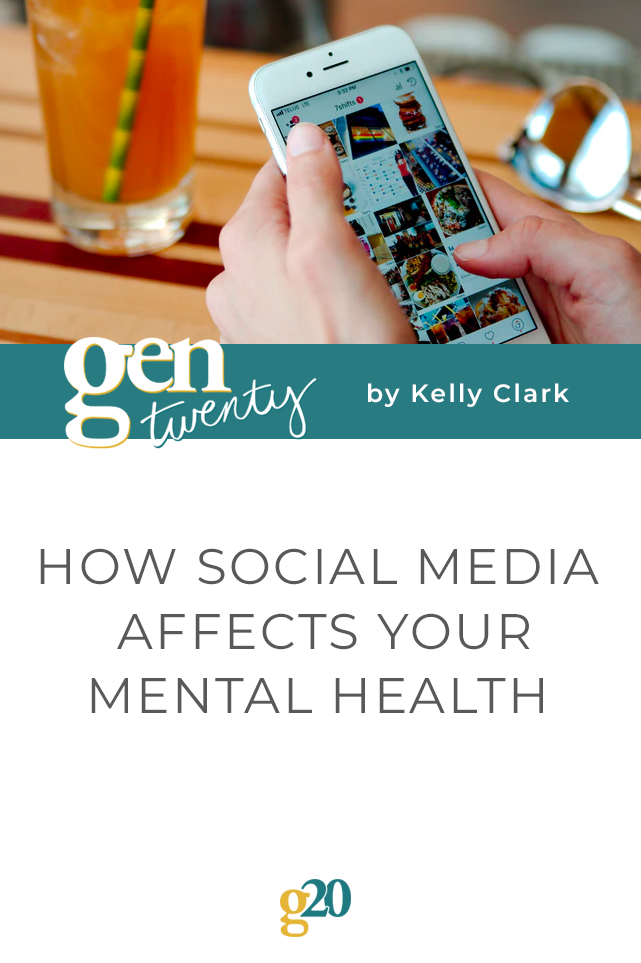
If we aren’t careful, our social media use could have the power to affect us even when we aren’t scrolling. One of the biggest areas that social media affects is our mental health. How often do you go on social media throughout your day? Americans spend, on average, a little over two hours each day on social media.
That doesn’t seem like a huge chunk of time. However, when you consider that we touch or pick up our phone on average 2,617 times a day, it’s clear that social media plays a major part in our day. We may not be on social media all 2,617 times we are on our phone, but I’m sure that a good bit of that number is spent on social media.
This can be both a good and a bad thing. It’s up to you to determine that. Today I wanted to share both ways social media can affect your mental health, as well as some action steps you can take moving forward. If you want to see more pros and cons of social media in other areas, this post has great information for you.
How Social Media Affects Your Mental Health
The Good
Social media can be a source of great joy and comfort. Let’s be honest, it’s been one of the best ways to connect with people during the pandemic.
- You feel more connected: Social media is great for people that have family and friends spread out all over the world. We may not be able to be there with them physically, but we can still feel just as connected by being able to talk to them and see what they are up to everyday.
- It can be a confidence boost: Sometimes when I’m feeling low, or struggling with something, I’ll share about it on social media. It’s more just to vent, and get all the negative in my mind out.
- What takes me by surprise sometimes is the outpouring of support I get from people. It’s always a mix from close friends to people I don’t talk to often, which is nice.
- You may feel less alone in your struggles: One of the main reasons I’ve been able to get through my depressive episodes is that I notice others are struggling, or have struggled, as well. Almost every time I’m in a bad place I’ll see that someone shared an article that inspires me to keep going, or validates what I’m going through. Having a mental illness can be incredibly isolating, so it helps to see that others have overcome what you are struggling with.
Action Steps: Even though you see social media in a positive light, many others don’t. Shine your light on your channels by being encouraging, kind, and authentic. You never know who you can impact by doing that.
The Bad
Social media is all fun and games, until it’s not. Here are some of the negative effects that come with social media:
- You could get caught in the comparison trap: This is the most common negative effect of social media. We are all guilty of this from time to time. It’s easy to catch yourself comparing. Our social media accounts only tell a fraction of our story, our highlight reel as some call it. That is why everyone’s life seems to be perfect, when ours isn’t. We are comparing our full story to their highlight reel. That isn’t fair to ourselves, is it? That is why I’m so open about my struggles on my personal accounts. I don’t want to contribute to someone else feeling bad about themselves. If we all tried to be a little more authentic when posting, social media may feel like a happier place.
- Scrolling can make you feel more alone: Picture this: you are home alone on a Friday night, and you get on Instagram, Facebook, whatever your favorite app is. As you are scrolling you see post after post of your friends/followers doing fun things, or hanging out with other people.
- This has happened to me so many times. It’s hard to not feel discouraged or lonely in this situation. I find it best to just get off of social media and go watch a movie, call/text a friend, etc..
- It can increase depression: style=”font-weight: 400;”> Enough of a combination of the two above points, and your mental health history, can cause your depression to strengthen. If this happens it’s best to get off the apps, and seek professional help.
Above all else, make sure you reach out to someone if you are seriously struggling. This can be a close family member or friend, or even a therapist.
Good Social Media Habits/Practices
In order to maintain a healthy relationship with social media, we need to add some new habits and practices to our lives. Here are a few that you can start today.
- Unplug regularly: Sometimes the best thing to do is step back and reset. I love achieving this by unplugging. If you are unfamiliar with what unplugging is, this article has some great tips on completing a digital detox. You can choose any length of time you want to unplug, a day, a few days, a week, etc.. My favorite length is about three days.
Action Steps: Pick one of these good practices to try. Take note on how you feel when doing this practice regularly. If it doesn’t work for you try another one, or a combination of them.
I’d encourage you to examine how you feel the next time you’re on social media. Now that you know how social media affects your mental health, let that guide you to any changes you need to make. I hope these tips that I’ve shared with you today help you to do that.
